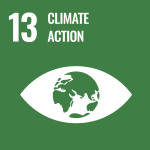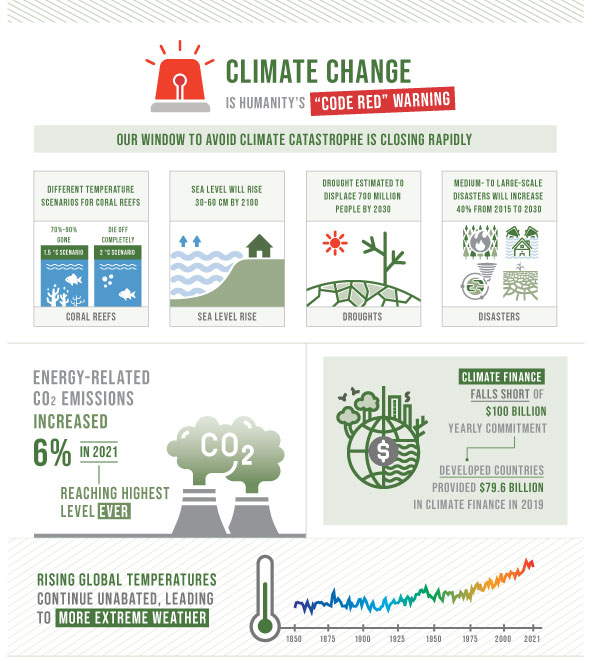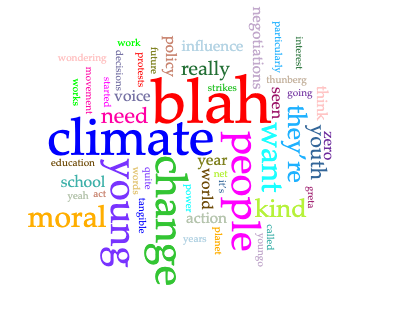Unit 16 Climate: SDG13
Climate Action

Goal no. 13 of the 2030 Agenda for Sustainable Development aims to take urgent action to combat climate change and its impacts.
Click on the arrows to reveal more information about SDG13. You don’t need to remember everything you read – the main thing is to get an overview of this Goal.
Information and targets reproduced under the terms and conditions of United Nations websites. Copyright (2023).
A reminder that links in this e-book do not open in a new tab. If you click on any link to a webpage, click the back button in your browser to return here.
Key vocabulary
Check that you know the meaning and the whole word family of these key words before you begin the Unit. (NB there may be other versions of the word forms – these are the common forms in the context of SDG13). Also notice some common collocations in bold in the ‘Why this goal? and ‘Targets’ sections above. Add any new words, word families or collocations that you would like to remember to your vocabulary book.
Verb Noun Adjective
To change change changing/changeable
To emit emission emitted/light-emitting
To reverse reversion reversible
To mitigate mitigation mitigating
Introduction – In your local context…
In this Unit you’ll find out why the public sometimes fail to support measures designed to address climate change and consider some ways to change attitudes, as well as learning about the influence young people have on climate politics.
- Do you have any experience of communities resisting changes that are designed to help them and be of benefit to the environment?
- Have you ever joined a campaign or a march or a political cause related to climate change?
Data visualisation – Climate change is humanity’s ‘code red’ warning
Before you read
- In Unit 15 you learned about changes happening in the animal kingdom as creatures adapt to warmer temperatures. How many examples can you remember?
- In Unit 10 you learned about extreme weather events. What examples of natural disasters or extreme weather events have you heard about or experienced?
Read
Read the infographic below (right click the image to open in a new tab and see the infographic full screen) and complete the tasks.

Download the transcript here: Unit 16 Infographic transcript
What do you think?
- What is your opinion of the way the burden of climate change falls on poor countries – not just in terms of extreme weather events leading to drought and hunger, but also by requiring them to provide finance to tackle it?
- Do you think governments have been pro-active enough in recent years to introduce measures to control greenhouse gas emissions that can prevent rising temperatures?
Reading – How to make climate action popular
Before you read
‘Green new deal’ proposals call for public policy to address climate change and simultaneously achieve other social aims such as job creation, affordable housing and the reduction of economic inequality. For example:
- Insulating homes and building low-carbon, affordable housing could slash energy bills and reduce emissions at the same time.
- Creating nature-friendly farming offers healthier food and enriched wildlife.
- Expanding and improving public transport would help ease congestion and allow people to breathe cleaner air.
- In the text you’ll read about the fact that the public often oppose measures like these, even when they are designed to improve their well-being. Can you think of any reasons why?
- In Unit 6 you learned the word equity. Can you think of a link between government measures designed to address climate change and the idea of equity?
- The examples above suggest overlaps between the SDGs. Can you think of any others? Use the list on the Welcome page to help you.
Vocabulary – Lack of support
The first half of the text (paragraphs 1 – 5) deals with the fact that measures to tackle the climate emergency are sometimes met with opposition from the public, who don’t like the measure being proposed. Before you read the whole text, read the sentences extracted from the text and complete the task.
Read for main idea and for detail
How to make climate action popular

Ambitious action is needed to stop average global temperatures rising above 1.5°C. But some measures to cut fossil fuel use and develop alternative industries have provoked resistance. Wind farms can be a common source of public ire, and so can carbon taxes – as large protests in France and Australia show.
Opposition to climate action can also arise when people are faced with the consequences of moving away from fossil fuels in everyday life, whether it’s changes to how we travel, eat, and heat or cool our homes. Even where people are broadly in favour of doing something about climate change, that support can evaporate when it involves changes to their daily routines.
So what’s the secret to making climate action popular? Scholars have converged on two key ingredients: equity and participation.
Equity
The costs and benefits of climate action should be fairly distributed, and people who are likely to struggle to cope with any changes need support. In British Columbia, Canada, resistance to broad-based carbon taxes on fossil fuels in transport and electricity generation has been mild. One reason for this is that the provincial government offered low-income residents tax credits to balance out the financial hit.
The yellow vests movement (gilets jaunes in French) led a very different response to a fuel levy increase in France in 2018-19. This price hike would disproportionately affect people already struggling financially. Failing to fairly distribute the costs of climate action risks sparking a public outcry and alienating people who might otherwise support such measures.
There’s an opportunity when crafting climate policy to not only avoid this kind of backlash, but to also make people enthusiastic about the wider benefits of decarbonisation. This idea is at the heart of the concept of the green new deal. For instance, insulating homes and building low-carbon, affordable housing could slash energy bills and emissions at the same time. Creating nature-friendly farming offers healthier food and enriched wildlife. Expanding and improving public transport would help ease congestion and allow people to breathe cleaner air.
Participation
Sometimes the people contesting a policy are not against taking action on climate change, they simply want things to be done differently. For example, in the case of the yellow vests, new research suggests many protesters were demanding that processes for deciding climate action be made more inclusive. Climate assemblies and other kinds of consultation that allow the public to have a say in the direction of national and regional climate policy have been used in France, Ireland, and the UK.
Research shows that participation must be meaningful for the public to accept the results. When people are invited to develop policy, governments that fail to act on their recommendations risk eroding trust.
The same issue can occur when governments fail to make clear how the decisions of citizens assemblies will be used. The advice that members of the public arrive at in these deliberative processes may be set aside if it competes with the of powerful figures like industry lobbyists. Ultimately, public participation should not be used by politicians to outsource, delay or deflect responsibility for difficult decisions.
So, while there are no easy answers for how to make a government’s climate agenda legitimate, paying close attention to equity and participation is important. That will mean tackling inequalities in wealth distribution and strengthening democratic processes so that they’re capable of the long-term planning necessary.
In countries around the world, surveys suggest that people are more worried about climate change than ever. Channelling public concern towards concrete actions that improve lives is the best course of action that research recommends. But as governments roll out climate policies, it’s also very important they continue to learn from the experience.
Large-scale public investment and industrial policies to manage the transition from fossil fuels are increasingly part of the climate debate. This would have been unthinkable just a few years ago. New and creative ways of dealing with climate change that invite ordinary people into the process can generate further enthusiasm and shift the focus away from limits and sacrifice.
NB This version of the article, with permission from the author, does not include the hyperlinks to supporting articles found in the original. Click the title for the full version of the text, published under a CC BY ND licence in The Conversation, which should be used for reference and sharing.
Grammar – Modal verbs of lost opportunity
Throughout Develop Your English you’ve learned about many inactions on the part of those with money and influence, and lost opportunities to address the targets of the Sustainable Development Goals. The sentence from the conclusion of the text reminds us that despite this, some progress has been made in terms of climate action.
‘Large-scale public investment and industrial policies to manage the transition from fossil fuels are increasingly part of the climate debate. This would have been unthinkable just a few years ago’.
Focus on modal verbs of lost opportunity: could have, would have & should have + past participle
‘Could have’, ‘would have’ and ‘should have’ + past participle can be used to talk about a lost opportunity, or something that did not happen in the past.
Could have – for something that was possible in the past but did not happen.
In France, the government could have consulted with the people about the proposed changes.
Should have – for an opportunity in the past that wasn’t taken (and the speaker thinks this is wrong).
In France, the yellow vests protestors said the government should have consulted citizens about the proposed changes and distributed the costs more fairly.
Would have – for something that was desired in the past but did not happen (often followed by but…).
In Canada, residents would probably have resisted taxes on fossil fuels, but the government offered tax credits to mitigate the expense.
Practice
Speaking – Discussion
In March 2019 the Swedish climate activist Greta Thunberg wrote on the social media site Twitter: ‘Over 1.5 million students on school strike 15/3. We proved that it does matter what you do and that no one is too small to make a difference’.
Thunberg, G. (2019) ‘Over 1,5 million students on school strike’ Twitter, 15 March. Available at: https://twitter.com/GretaThunberg/status/1107288729482342401 (Accessed: 1.8.2023).
- Have you heard of Greta Thunberg? And school strike for climate change?
- What do you think of the fact that on one day, over 1.5 million school children around the world went on school strike – missing school to protest that not enough is being done to mitigate against climate change?
- What do you think Thunberg means when she says ‘no one is too small to make a difference’?
- Do children in your local context join the school strike?
- Greta Thunberg currently has 5.7 million followers on Twitter. Does that tell us anything, or not really?
Pronunciation – Sentence stress
English is a stress-timed language. In Units 1, 2 and 5 you learned about word stress. Here you’ll focus on sentence stress, and notice how changing the main stress in a sentence can change its meaning.
Focus on contrastive stress
Read this sentence:
We proved that it does matter what you do, and that no-one is too small to make a difference.
If we move the main stress and emphasise one part of the sentence, the meaning changes:
- We proved that it does matter what you do and that no one is too small to make a difference.
- We proved that it does matter what you do and that no one is too small to make a difference’.
- We proved that it does matter what you do and that no one is too small to make a difference’.
- The meaning of the first sentence is that despite what other people say, our actions really matter.
- The meaning of the second sentence is that every individual can make a difference.
- The meaning of the third sentence is that no one is too young or powerless to support climate action.
Practice
Vocabulary
Use the clues to complete the crossword with terms relating to climate change that you have learned in Units 15 and 16. Add any you want to remember to your vocabulary note-book.
Listening – The youth movement grows up (5 mins)
![]()
Credit: The Conversation, The Anthill podcast. Jack Marley, Environment + Energy Editor and Host of the Climate Fight podcast series. Licence: CC BY ND

Before you listen
- One of the questions that you thought about after reading the infographic was ‘Do you think governments have been pro-active enough in recent years to introduce measures to control greenhouse gas emissions that can prevent rising temperatures?’. In the Listening you will hear Greta Thunberg, a key figure in the youth climate movement, say the following. Read the quote and decide how she would answer that same question:
‘There is no planet B. There is no planet blah. Blah, blah, blah. Blah, blah, blah. This is not about some expensive, politically correct green act of bunny-hugging or blah blah blah. Net zero by 2050 – blah, blah blah. Net zero – blah, blah, blah. Climate neutral – blah, blah, blah. This is all we hear from our so-called leaders. Words. Words that sound great but so far have led to no action’.
2. Can you guess what the informal expression ‘blah, blah, blah’ means?
3. Look at the word cloud created from the transcript. The most frequently used words (the biggest ones in the cloud) are blah (19); climate (14); people (9); change (9); young (8); want (6); moral (6). With the title in mind (‘The youth movement grows up’) create a sentence that uses as many of these words as possible and predicts the main point of the listening.

Listen for main ideas
Play the audio here:
(Or access The Conversation podcast and listen from the start to 5.34mins).
You’ll hear an interview with Dr Harriet Thew just before COP26 – the United Nations Climate Change Conference held in 2021. Below are the questions the interviewer asks her. As you listen note as many of the key points in her reply as you can:
After you listen – Discuss
According to the text, how much influence do young people have in terms of bringing about action on climate change?
Download the transcript here: Unit 16 Listening Transcript
Writing
In this Unit you’ve learned about the need for climate action and ways to influence climate politics. Community leader Alejandro Naiman’s story details some of the devastating effects of the climate crisis in Chile and their efforts to adapt to it.
Read Alejandro’s story and write a response to it that incorporates what you know about the climate crisis and the need for action and SDG13 Climate Action. Write about:
- Evidence of the climate crisis in this local context.
- The way people’s livelihoods are threatened by climate change.
- What people are doing to mitigate the effect of climate change.
- Any other topic relevant to the challenges of defending the environment and SDG15.
Living Climate Change on the Coastline of Chile
“We are seeing changes that we have never seen before – excessive rain, inexplicable things,” says Alejandro Naiman, a hake fisher and community leader from El Manzano in southern Chile. Small-scale fishing is the lifeline for most people living in this coastal community, which is now threatened by the changing climate. Dramatic environmental changes are affecting the availability and abundance of species, forcing artisanal fishers and small-scale fish farmers to modify their livelihoods.
To mitigate the impact on their livelihoods, people from El Manzano and other coastal communities have come together to learn new ways to add value to their products and diversify their production. “People talk about climate change; we are living it every day,” says Juan Torrejón, head of the local aquaculture association in Tongoy. “…We have a proposal for a processing plant, so our associates and cooperatives are not just individual producers, but we can also offer products.”
They are also considering developing sustainable tourism as an alternative source of income. Matías Torres, a fisher from Coliumo, explains, “Coliumo offers more than fishing. There is diving, nature trails, trekking and gastronomic products with a local identity. All these activities together allow the people of Coliumo to have alternatives to better adapt to the effects of climate change.”
Department of Economic & Social Affairs Statistics Division (2022) ‘Bringing Data to Life: SDG impact stories from across the globe.’ Available at: https://unstats.un.org/sdgs/report/2022/SDG2022_Flipbook_final.pdf
Speaking
Read the summary and discuss the question that follows.
SDG13 Summary
Climate change is increasing the frequency and intensity of extreme weather events such as heat waves, droughts, floods and tropical cyclones, aggravating water management problems, reducing agricultural production and food security, increasing health risks, damaging critical infrastructure and interrupting the provision of basic services such water and sanitation, education, energy and transport.
Reproduced with kind permission of the UN Environment Programme, 2023. All rights reserved.
Identify the object(s) of each of the verbs in bold, then use the same verbs to share examples of how climate change is evident in your local context.
A reminder that if you have access to the internet and are studying by yourself without other people to practice your spoken English with, you can use artificial intelligence (AI) to gain fluency practice. See here for instructions and prompts.
Here are some prompts related to this Unit:
- ‘Let’s have a dialogue about how the burden of climate change often falls on poor countries. Give me some information about how this happens and ask me for my opinions about it.’
- ‘Tell me why the public often oppose environmental policies designed to designed to improve their well-being. Ask me for my opinion about each of the reasons you give me.’
- ‘Let’s have a dialogue about Greta Thunberg’s School Strike for Climate Action. Give me some information about it and ask me my opinion.’
Extension activities
After every two Units you are offered a choice of extension tasks. Use the menu bar on the left-hand side of the screen to access Extension Activities Units 15 and 16.
End of Section 4 – Health and Well-being
This is the end of Section 4. Think about:
- Four key things that you found out by working through the topics (SDG2 Zero Hunger, SDG3 Good Health and Well-being, SDG15 Life on Land, and SDG13 Climate Action).
- One language skill that you think you have developed a bit further.
- Some new vocabulary items that you have mastered (i.e. you can remember them and use them appropriately).
- An area of language that you would like to develop further.
- Any lifestyle change that is possible in your context to help achieve the aims of one or more of these SDGs.
I hope working through the Units in Develop Your English has been informative and enjoyable, and that is has helped you develop your language skills.
If you would like to continue developing your English, have a look at the Consolidation section where you’ll find a wide range of web resources and self-study suggestions to support your continuing development.

